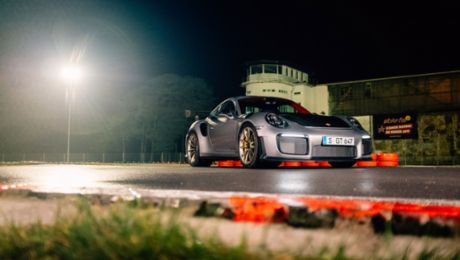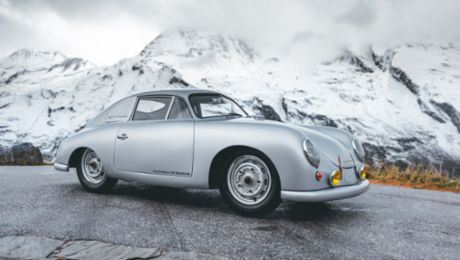Smoking flares used to mark out the route provide an exciting visual backdrop for this action-packed episode. True to the motto ‘the winner stays on,’ two of the models compete against each other in each race.
The Porsche Carrera GT and the Panamera Turbo S E-Hybrid Sport Turismo are the first to take to the track – with the hybrid saloon beating the Carrera GT by 0.5 seconds. Hard to believe, but given the fact that there are almost 14 years of development between the two cars, it actually makes perfect sense.
911 against luxury saloon
In the next race, the 911 Turbo S challenges the luxury saloon. It quickly becomes clear why the 911 series has always been so popular with sports car fans. It is not only its iconic silhouette that impresses, but also its power: the 911 Turbo S hits the 100km/h mark in just 2.9 seconds (fuel consumption combined 9.1l/100km; CO2 emissions 212g/km).
If you’re asking what is still to come, we won’t keep you in suspense: the 911 GT2 RS, driven by the current record holder at the Nürburgring – Lars Kern, who is slightly late because of his warm-up on the go-kart track.
All-wheel drive against rear-wheel drive
In this penultimate race, the viewers get a glimpse of what it’s all about when the all-wheel drive of the 911 Turbo S competes against the rear-wheel drive of the GT2 RS. Thanks to its 515kW (700hp; fuel consumption combined 11.8l/100km; CO2 emissions 269g/km), the GT2 RS manages to gain a razor-thin advantage in terms of speed. With just a 0.1 second leading edge, it is the winner of the race.
In the final showdown with the 918 Spyder, however, the GT2 RS doesn't stand a chance. The combined hybrid drive of the 918 Spyder and the all-wheel drive launch it to 100km/h in an impressive 2.6 seconds. And so, the winner of this mini competition is clear: the 918 Spyder gets to take home the trophy.
Consumption data
911 GT2 RS: Fuel consumption combined 11.8 l/100 km; CO2 emissions 269 g/km
911 Turbo S: Fuel consumption combined 9.1 l/100 km; CO2 emissions 212 g/km
Panamera Turbo S E-Hybrid Sport Turismo: Fuel consumption combined 3.0 l/100 km; CO2 emissions 69 g/km; electricity consumption (combined) 17.6 kWh/100 km




